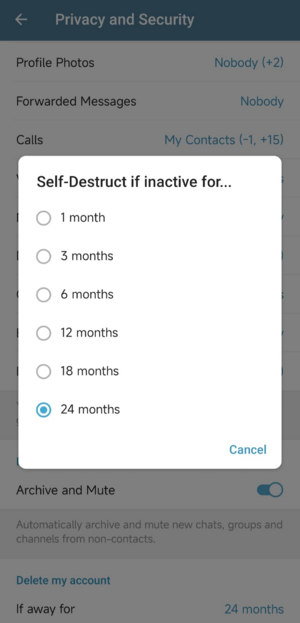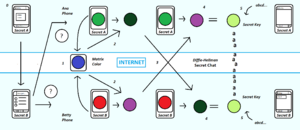Telegram (software) facts for kids
 |
|||||||||
| Developer(s) | Telegram FZ-LLC | ||||||||
|---|---|---|---|---|---|---|---|---|---|
| Initial release | 14 August 2013 | ||||||||
| Stable release(s) [±] | |||||||||
|
|||||||||
| Written in | Desktop: C++, C, Java, Python Android: Java iOS: Swift |
||||||||
| Platform | Android, iOS, iPadOS, Windows, macOS, Linux, KaiOS, Web platform | ||||||||
| Available in | 66 (officially 12) languages | ||||||||
|
List of languages
Chinese (Beta), English, Russian, Persian, Turkish, Italian, Arabic, Ukrainian, Kazakh, Uzbek, Portuguese, Spanish, German, Dutch, French, Japanese (Beta), Korean, Indonesian, Malay, Belarusian, Catalan, Polish, Finnish, Hebrew
|
|||||||||
| Type | Instant messaging | ||||||||
| License | GNU GPLv3 only with OpenSSL linking exception (clients), proprietary (server) | ||||||||
| Founded | March 2013 |
|---|---|
| Headquarters | Tortola, British Virgin Islands (legal domicile) Dubai, United Arab Emirates (operational center) |
| Area served | Worldwide |
| Founder(s) | |
| CEO | Pavel Durov |
| Industry | Software |
Telegram is a popular app for sending messages and connecting with friends. It works on many devices like phones, tablets, and computers. You can use it to send messages, share photos and videos, and even make voice or video calls.
Telegram was started in 2013 by two brothers, Nikolai Durov and Pavel Durov. It's known for being fast and secure. Many people around the world use Telegram, especially in parts of Europe, Asia, and Africa. In January 2021, it was the most downloaded app globally. By March 2025, Telegram had over 1 billion active users every month. To sign up, you usually need a phone number.
Contents
How Telegram Started
The Beginning
Telegram was created in 2013 by brothers Nikolai Durov and Pavel Durov. Before Telegram, they also founded a social network called VK. They left VK in 2014. Nikolai developed the special technology that Telegram uses to send messages. Pavel helped by providing money and setting up the necessary computer systems.
Telegram says its main goal is not to make money. It is set up as a company in the British Virgin Islands and Dubai. The company keeps its office locations private to protect its team and user information from government requests. Since 2017, Telegram's main base has been in Dubai, United Arab Emirates.
How Telegram Grew
Telegram quickly became very popular. In October 2013, it had 100,000 users every day. By March 2014, this number grew to 15 million daily users.
Many people started using Telegram, especially when they wanted a more private way to chat. For example, in October 2014, many people in South Korea switched to Telegram.
Here's a quick look at how many users Telegram gained over the years:
- December 2014: 50 million active users.
- September 2015: 60 million active users.
- February 2016: 100 million active users.
- March 2018: 200 million active users.
- April 2020: 400 million active users.
- January 2021: About 500 million active users.
- June 2022: 700 million active users.
- July 2023: Over 800 million active users.
- March 2024: 900 million active users.
- July 2024: 950 million active users.
- March 2025: Over 1 billion active users.
India is the country with the most Telegram users.
Cool Features of Telegram
Sending Messages
To use Telegram, you sign up with your phone number. Your messages are linked to your number and a username, not just your device. This means you can log in on many devices, and your chats will sync automatically. If you don't use your account for 6 months, it can be set to delete itself.
You can send text, photos, videos, and files up to 2 GB (or 4 GB with Premium). You can also edit messages after sending them or delete them for everyone in the chat. Telegram lets you bring your chat history from other apps like WhatsApp into Telegram.
If you start typing a message on one device, it saves as a "cloud draft." You can then finish typing it on another device, like your laptop. You can also translate messages right in the app.
Reactions and Stickers
You can react to messages with emojis. Premium users have more reaction choices. These reactions often have cool animations.
Telegram also has many stickers. These are like bigger, more expressive emojis. They can be static, animated, or even video stickers. You can find many different sticker packs created by designers and other users. Some stickers even have full-screen effects!
Special Message Options
You can schedule messages to send later or when your friend comes online. You can also send a message "without sound" so it doesn't notify the other person. Messages can be forwarded, and you can choose to hide who sent the original message.
There's a special "Saved Messages" chat where you can save important messages or notes for yourself. Only you can see this chat.
You can organize your chats into folders, like "Work" or "Family," to keep things tidy.

Telegram has "Secret Chats" that are extra private. These chats are encrypted from end-to-end, meaning only you and the person you're chatting with can read them. They are only on the device where you start them. Secret Chats can also prevent screenshots on some devices and can be set to self-destruct after a certain time.
Groups and Channels
Telegram lets you create and join groups and channels.
- Groups: These are chats for many people, up to 200,000 members! Groups can be public or private. Admins can set rules and use bots to help manage the group. Groups can even be split into smaller "topics" for different discussions.
- Channels: These are like one-way broadcasts. The channel owner or admins post content, and followers can read it, react, and sometimes comment. Channels can have an unlimited number of subscribers. They are great for sharing news or updates with a large audience. Many news services and even governments use Telegram channels.
Video and Voice Calls
Telegram offers one-on-one voice and video calls that are encrypted for privacy. You can also have group voice chats and group video chats. These group calls support sharing your screen, recording the call, and reducing background noise.
In channels, you can start a live stream to broadcast video to your followers. In April 2025, Telegram launched secure group calls with special encryption. These calls can handle up to 200 people.
Bots and Mini Apps
Telegram has a platform for "bots." Bots are like special accounts run by computer programs. They can do many things, like answer questions, help manage groups, or even host mini-games and apps right inside Telegram. Many businesses use bots to talk to their customers.
In July 2024, Telegram Mini Apps reached 500 million monthly active users.
Stories
Like other social apps, Telegram lets users post "stories." These are short videos or photos that disappear after a while. Telegram stories have cool features like a dual-camera mode and special privacy settings. You can even edit stories after you post them.
Premium Features
Telegram Premium is an optional paid subscription launched in June 2022. It gives users extra benefits, such as:
- Larger file uploads.
- Faster download speeds.
- Unlimited voice message transcription (turning voice into text).
- More options for stickers, emojis, and reactions.
- Special customization features.
- The ability to translate entire chats instantly.
You can get Premium through app stores, Telegram's own bot, or even with cryptocurrency.
Other Telegram Tools
- Telegraph: This is a simple tool where you can write and publish articles. You can link them to your Telegram account to track views and edit them later. It's great for quick, clean articles.
- Telegram Login: This feature lets you sign into other websites using your Telegram account. It shares your Telegram name and profile picture, but keeps your phone number private.
- Telegram Passport: This system helps you share your official ID documents with online services that need them. Telegram says it doesn't store or access your private document data.
- Bugs and Suggestions: Telegram has a platform where users can report problems or suggest new features. Other users can vote on these ideas.
How Telegram Works Behind the Scenes
Privacy and Security
Telegram uses a special encryption method called MTProto to keep your chats secure. For "Secret Chats," this encryption is very strong, making sure only you and the person you're talking to can read the messages.
Telegram uses central computers called "servers" to handle messages. These servers are located in different countries to make the app fast for everyone. For users in Europe and the UK, data is stored on servers in the Netherlands to follow privacy rules.
Telegram says it has never shared user messages with governments or other companies. However, Pavel Durov has mentioned that Telegram has shared some data for legal requests from governments in countries like Brazil and India. Users can check how many requests from their country have been processed using an official bot.
Telegram Apps
Telegram has many different apps for various devices. Some are made by Telegram, and others are made by the community. Most of these apps are "open-source," meaning their code is available for anyone to see and check.
Here are some of the official Telegram apps:
- Telegram for Android: Works on Android phones and tablets.
- Telegram for iOS and iPadOS: Works on iPhones and iPads.
- Telegram X: An alternative Android app designed to be faster and smoother.
- Telegram Desktop: An app for Windows, macOS, and Linux computers.
- Telegram for macOS: A special app just for Apple computers.
- Telegram Web: You can use Telegram in your web browser.
You can often get the Android app directly from Telegram's website. This version might get updates faster and can sometimes show content that app store versions might block due to their rules.
Telegram's Business Side
Telegram was first supported by Pavel Durov's own money. Later, it raised money from investors.
Making Money
Telegram has said it will never show ads in private chats. However, it does show "Sponsored Messages" (ads) in large public channels that have over 1000 followers.
Telegram also has paid features for businesses and offers a Premium subscription for users. In June 2024, Telegram launched "Telegram Stars" to make it easier to buy digital items and services within the app.
In December 2024, Pavel Durov announced that Telegram had become profitable. This means the company is now making enough money to cover its costs and grow, thanks to Premium subscriptions and ad sales.
The Open Network (TON)
In 2017, Telegram started working on a special project called "The Open Network" (TON) and its own digital currency called "Gram." The idea was to create a huge online platform for apps and services, like a decentralized version of popular app stores.
However, the project faced legal challenges in the United States. In 2020, a judge ruled that Telegram could not distribute Grams. Because of this, Pavel Durov announced that Telegram would stop its active involvement with TON. Telegram had to pay a penalty and return money to the people who had bought Grams.
See also
 In Spanish: Telegram para niños
In Spanish: Telegram para niños
- Comparison of cross-platform instant messaging clients
- Internet privacy
- Secure instant messaging
 | Stephanie Wilson |
 | Charles Bolden |
 | Ronald McNair |
 | Frederick D. Gregory |




